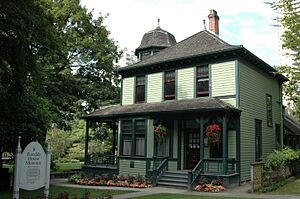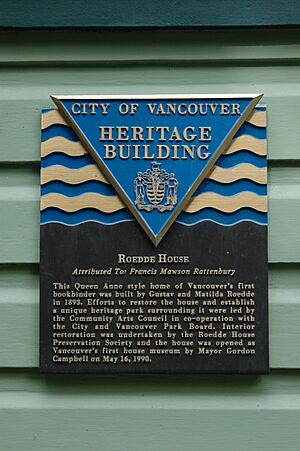Roedde House Museum facts for kids

Exterior of the museum
|
|
| Established | May 12, 1990 |
|---|---|
| Location | 1415 Barclay Street Vancouver, British Columbia, Canada |
| Type | Museum (Victorian era) |
The Roedde House Museum is a beautiful old home in Vancouver, Canada. It's located at 1415 Barclay Street. This house was built way back in 1893 for Gustav Roedde and his family. It's thought that a famous architect named Francis Rattenbury designed it. The house has a special look called the Queen Anne Revival style. For many years, it was used as a rooming house. But in the 1980s, it was carefully fixed up and filled with old furniture. Since 1990, it has been open to everyone as a museum.
Contents
Discovering Roedde House
The Roedde Family's Story
Gustav Roedde (1860-1930) came to North America from Germany in 1882. He finished learning how to be a bookbinder in Cleveland, USA. At a Halloween party, he met Matilda Cassebohm (1862-1951). She had also moved from Germany. Gustav and Matilda got married in Cleveland in 1883.
They lived in a few different cities, like San Francisco, California, and Victoria, British Columbia. Finally, they settled down in Vancouver, British Columbia, in 1888. Gustav Roedde's bookbinding business grew quickly as Vancouver became a bigger city. He was very skilled, especially with a technique called paper marbling. This helped him become a successful businessman. His company, G.A. Roedde Printers, is still in business today, though it has new owners.
Building a Victorian Home
The Roedde family's new home was finished in 1893. The architect believed to have designed it was Francis Rattenbury (1867-1935). He was a talented English immigrant. Francis Rattenbury also designed other famous buildings. These include The Empress Hotel and Vancouver's old courthouse. That courthouse is now the Vancouver Art Gallery.
The Roedde House has some special features. It has an uneven shape, lovely porches called verandas, and a round tower called a turret. These are all common in the Queen Anne Revival style. Both the inside and outside of the house are made from cedar and fir wood. This wood was easy to find and cheap back then.
Life in the Roedde Home
The Roedde family grew quite large. Gustav and Matilda had seven children and three big St. Bernard dogs. Sadly, their first child, Anna Henrietta, passed away at age four. This happened after she ate some berries that were not safe.
When World War I started, two of their sons, Walter Herman Widemann (who was adopted) and William August, went to Europe. They fought for the British army and thankfully returned home safely. During that time, their daughter Emma Cather moved back to the Roedde House. She brought her two daughters, Emma Gwendolyn and Kathleen Frances, with her. There are stories that the children would play in the upstairs storage room. From there, they could listen to the adults talking downstairs! In 1925, another daughter, Anna Catherine, passed away at age 28. She was a nurse at the Vancouver General Hospital and was on duty at the time. Later that same year, the family moved to a new home in Point Grey.
Saving Roedde House
From Demolition to Heritage
In the late 1970s, the Roedde House was almost torn down. But the Community of Arts Council of Vancouver stepped in. They argued that the house was very important to history and should not be destroyed. They succeeded! In 1976, the City of Vancouver officially named the house a "Class A Heritage Building." This meant the house could not be moved, and its outside walls could not be changed. The City of Vancouver then fixed up the outside of the house.
In 1984, a group called the Roedde House Preservation Society was formed. Their goal was to restore the inside of the house. They used old records and photos to make sure the house looked exactly as it did between 1893 and 1925. They even peeled off old wallpaper to find the original wall colors! The house was then filled with furniture and items that a middle-class family would have owned in the 1890s.
On May 12, 1990, the Roedde House Museum officially opened its doors. The mayor at the time, Gordon Campbell, was there for the opening.
Visiting the Museum
What You Can See
The museum has a collection of over 2,700 items. These include furniture, old clothes, books, and everyday household things. Some of these items even belonged to the Roedde family!
Some special things you can see include:
- A tall longcase clock made in 1775.
- An upright Steinway piano from 1893.
- Other interesting items like a stereoscope (for looking at 3D pictures), a chestnut roaster, and a special bread maker.
Activities and Events
Besides guided tours, the museum also hosts concerts. They have both Classical and Jazz music series. On Sundays, you can enjoy a "Tea and Tour" event. The museum serves a special "Roedde House Blend" tea. This tea is made just for the museum by the Metropolitan Tea Company.
 | Laphonza Butler |
 | Daisy Bates |
 | Elizabeth Piper Ensley |


